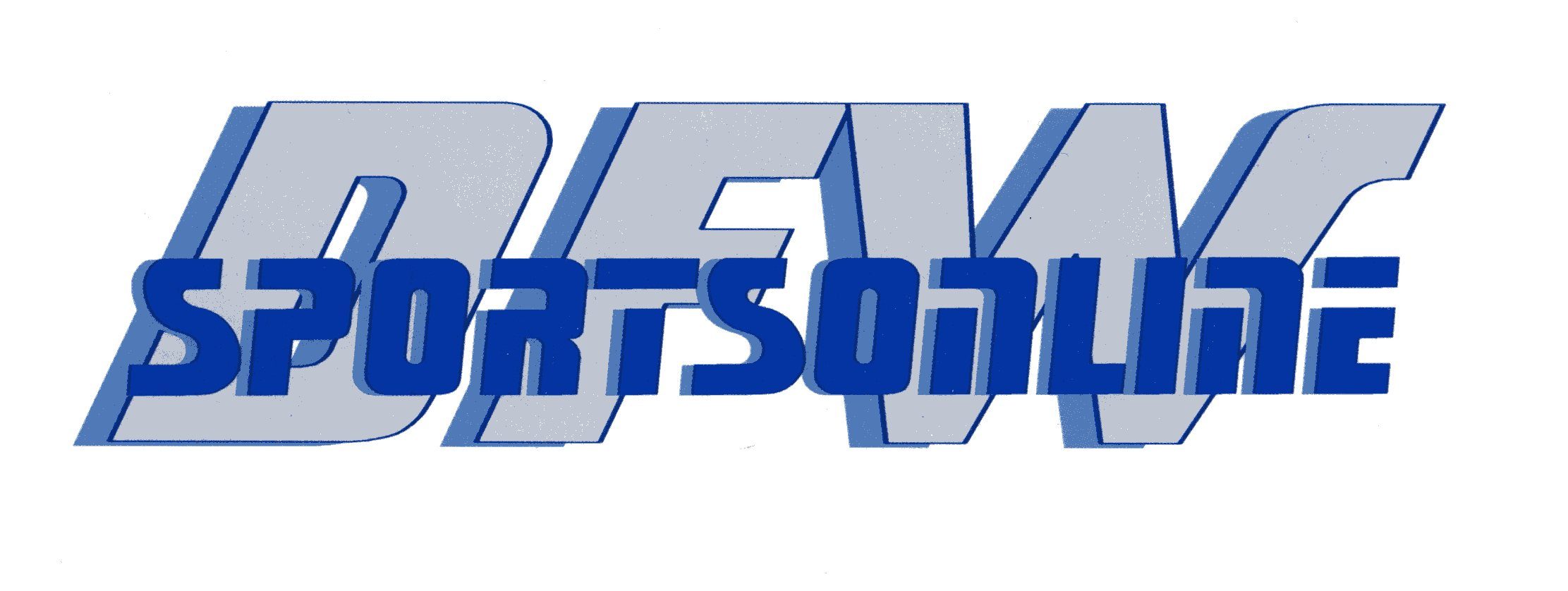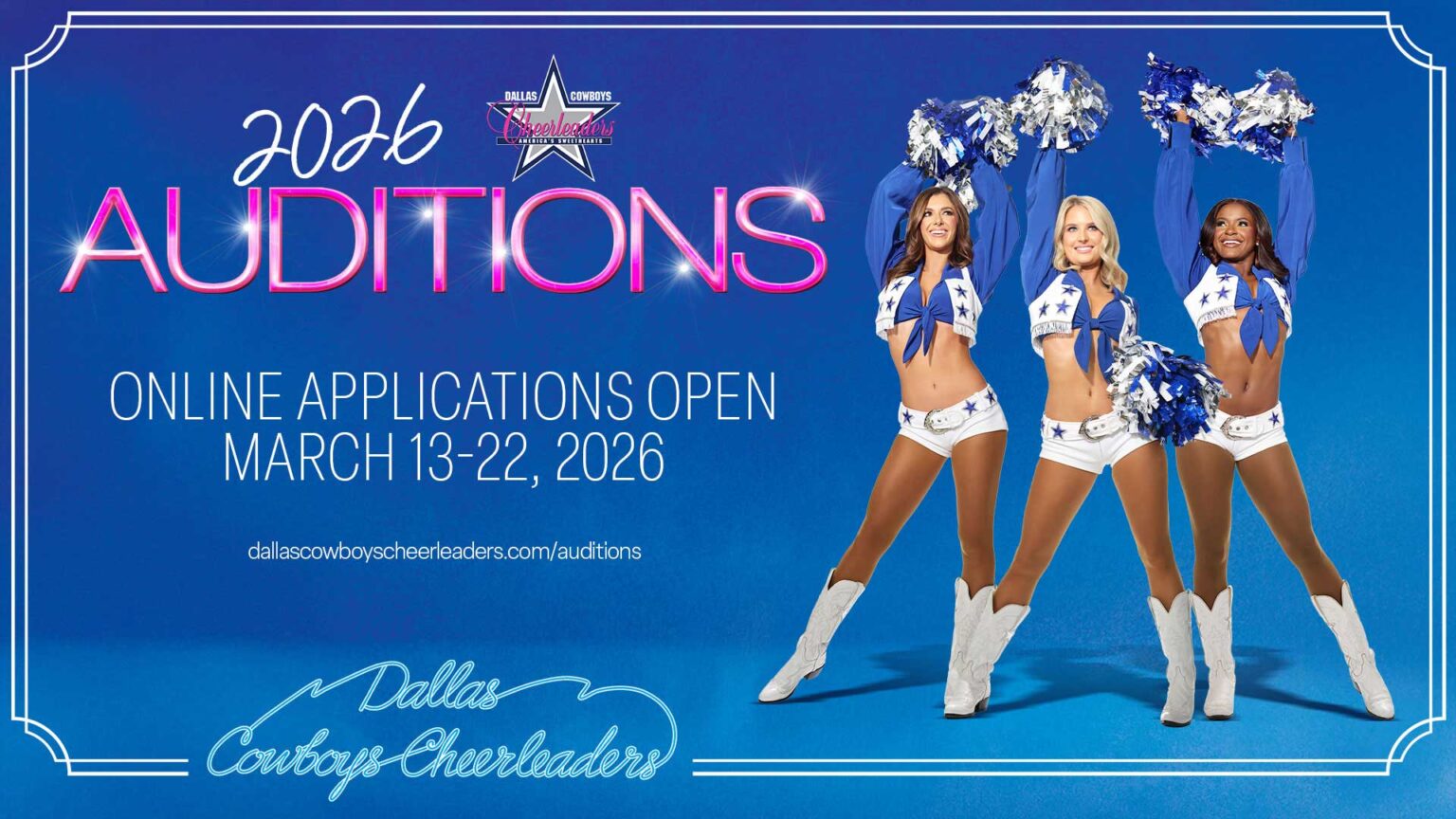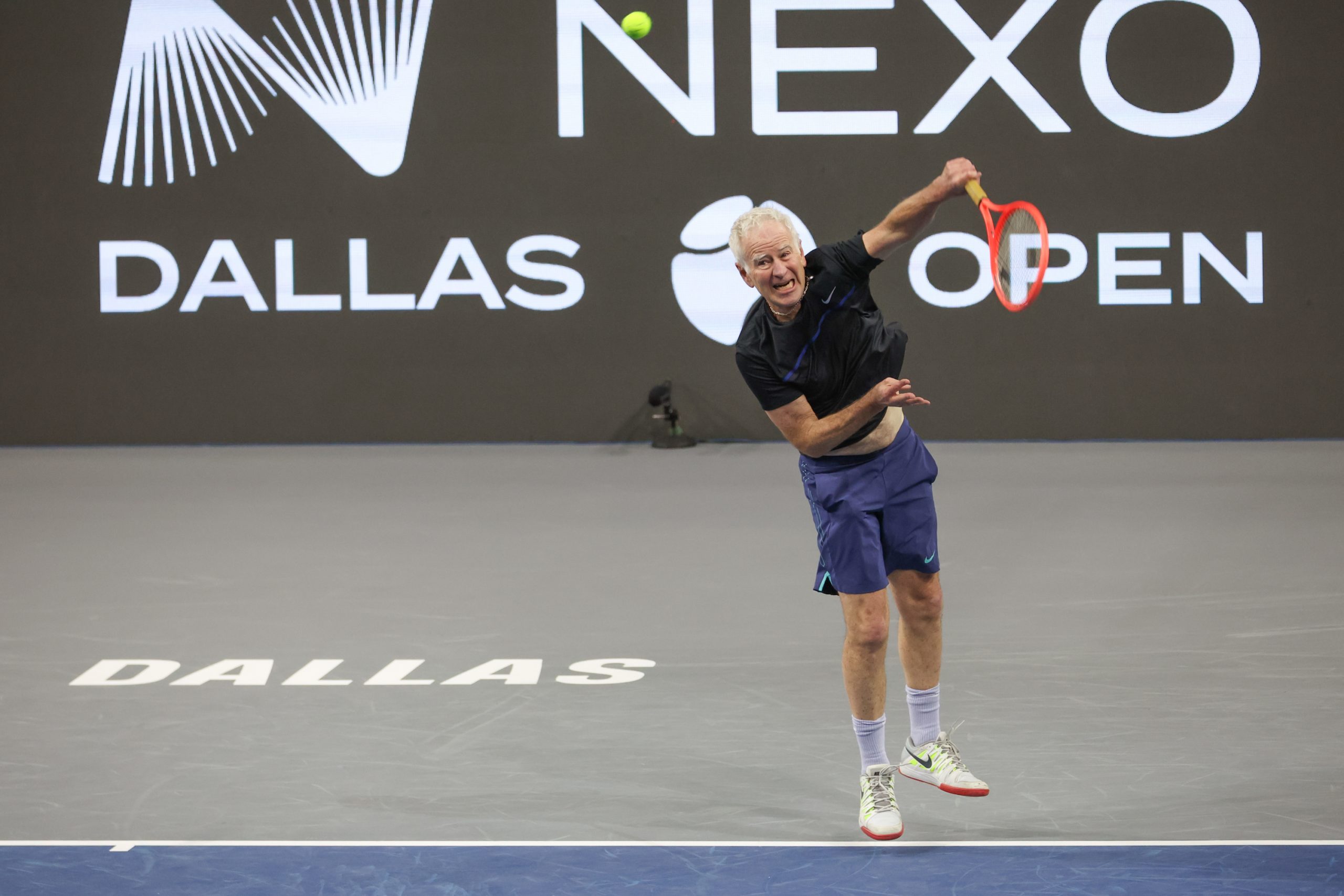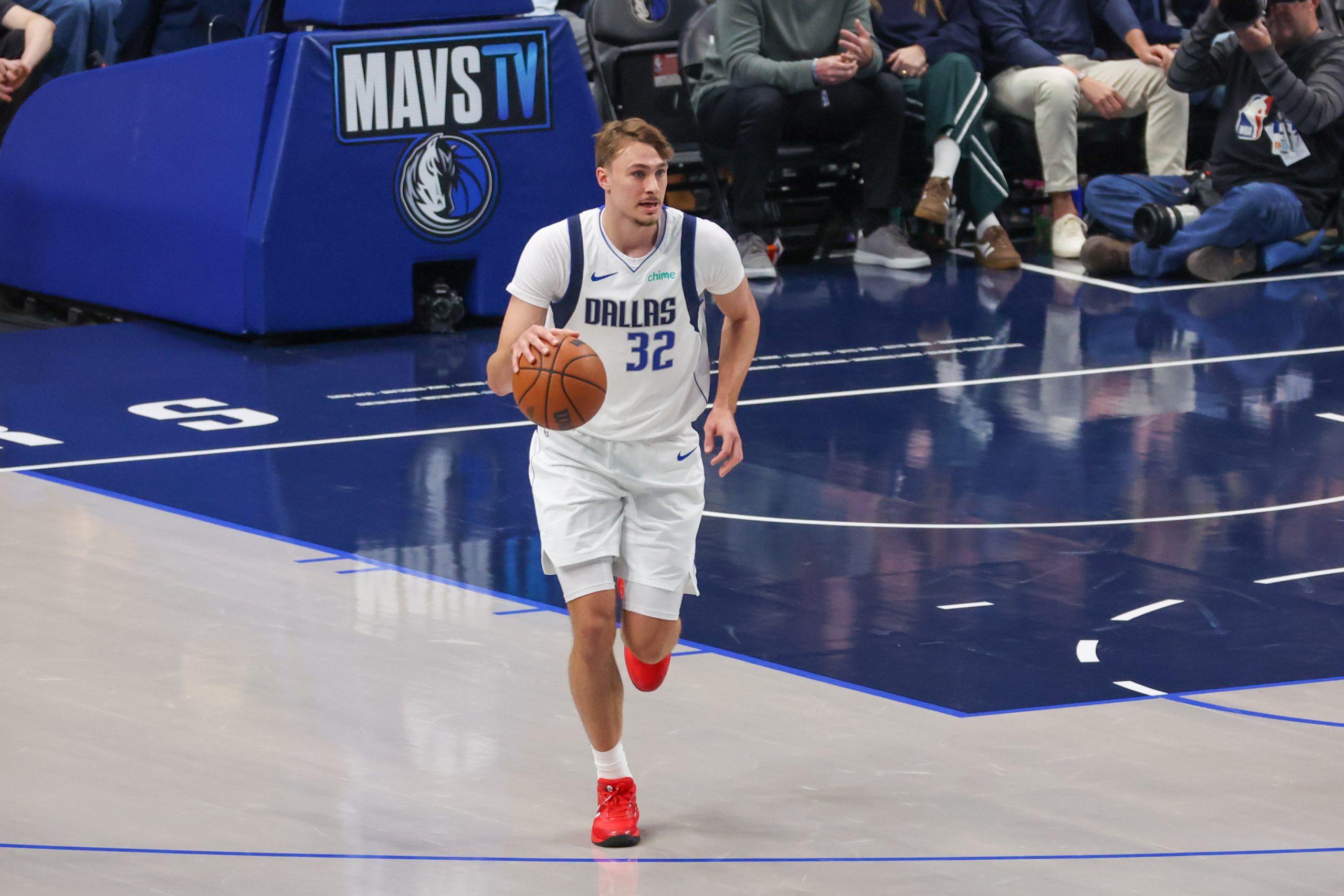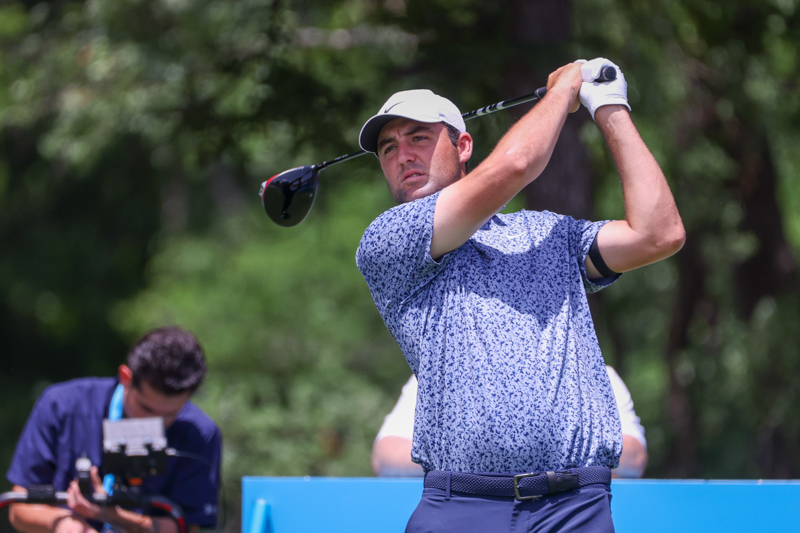
FORT WORTH, TX – MAY 23: Colonial Country Club hole 18 during the third round of the Charles Schwab Challenge on May 25, 2019 at Colonial Country Club in Fort Worth, TX. (Photo by George Walker/DFWsportsonline)
The sports world is on the cusp of the PGA Tour‘s return at the Charles Schwab Challenge at Colonial Country Club in Fort Worth, Texas.
In honor of the historic occasion, Chuck Cooperstein, the radio play-by-play announcer for the Dallas Mavericks and talk show host on 103.3 FM ESPN Radio, took some time to discuss the legendary venue that is Colonial Country Club and some of his favorite memories from his years of attending the site of the longest running PGA Tour event.
JAY BETSILL: Do you have a favorite memory or memories from the Colonial?
CHUCK COOPERSTEIN: The first time I walked on the grounds, which was in 1985. I had always watched the tournament on TV growing up, knew it was one of the great golf courses in the United States and knew of Ben Hogan’s history with the course and with the tournament. I play golf and I appreciate the history of the game, so just to be on those grounds was as memorable as anything. I was working at KRLD at the time and we were doing stroke-by-stroke coverage as we had also done for the Byron Nelson. So not only am I at the tournament and on the grounds, but I’m also working the tournament and I just thought that it was really, really cool. As time went on, I learned more about the club and the Wall of Champions and everything surrounding the place was just so pure to me as it related to the game of golf. For me, there are so many memorable tournaments including Keith Clearwater’s ridiculous final 36 in ’87; Meg Mallon winning the U.S. Women’s Open in ’91 when it was 103 degrees outside and the bent greens were dying; Nick Price rallying to win in ’94 with that tournament finishing on a Monday. Then there’s (Phil) Mickelson’s successes and Jordan’s (Spieth) successes and Tiger being there in ’97. It’s just a great place and for a place that has a history as it does, for it to be the host of the first tournament out of the box under these extraordinary circumstances, I’m so happy for them. Even if they can’t really do everything they want to do, but I think that it’s not overstating it to suggest that with everything the Colonial has been able to produce, going all the way back to the 40s when the tournament started, this will be the most historic Colonial or Charles Schwab Challenge and the most significant tournament that has ever been played on this golf course.
JB: Speaking of significance, the final field is the best in tournament history (since the rankings began in 1986), includes 18 of the top 25 in the world rankings. How cool is that for the golfers showing up to support the event?
CC: I think that golfers have always loved the golf course, but not everybody loves everything and not everyone loves the fact that there are so many doglegs on the golf course. We have heard that over the years. It doesn’t surprise me that they have the field they have because everyone wants to get out and play. The fact that there is a tournament to be played, prize money to be won, and it’s being played on this golf course, it is an excellent combination of factors that have led to where we are now. In normal years, the month of May is really difficult for Colonial and the Nelson in Dallas because there is so many quality golf courses including Quail Hollow in the first week that is a major championship venue. Then you have the PGA Championship, which of course is a major championship and before that, there was The Players Championship, where everyone was going to Sawgrass to play. Then you have Jack’s tournament at Muirfield (The Memorial) meaning there are so many great options for these guys to play leading into the U.S. Open that they don’t necessarily feel the need to play every week. Now, with the schedule being what it is, there is no reason for these guys not to play. The fact that the field is what it is should not come as much of a surprise and the fact that Colonial is first out of the box makes them the beneficiary of that.
JB: What are your predictions for this year’s Colonial and if you could write the script, who would you like to see donning the plaid jacket on Sunday?
CC: I think it’ll look like practice rounds on Monday and Tuesday when the course isn’t really crowded. Although there will be no fans, the course won’t be totally empty as I’m assuming there will be scorers and volunteers and some of the traffic that you normally have when putting on a PGA Tour event. So from that standpoint, it won’t look that different for those of us who will be watching on the Golf Channel or CBS on the weekend. And if you can add someone like Rory McIlory or Brooks Koepka to the Wall of Champions, someone who’s not been on the wall before, that’s what you’d want. When you think about it, most anyone of note in the history of professional golf from World War II to now save for Tiger Woods, Johnny Miller and Greg Norman are on that wall. If you’re telling me that McIlroy or Koepka or one of the big guns that has not won at Colonial previously gets their name on the wall, I think for the historical value that Colonial places on its event, that those would be ones that I’d be looking at for this year.
JB: You mentioned the words “Colonial” and “history” on multiple occasions. You’ve played Colonial many times, describe the chills you get when you’re on the first tee and you see the Wall of Champions.
CC: If you have any appreciation for the game of golf, you’re going to look at that and just say “Wow!” Then you just hope that when you tee it up, you’re able to get it somewhere in the fairway and it’s not too terrible of a tee shot on your way to getting to go and walk the golf course that so many of these guys have. Again, if you have any appreciation for the game, you can’t help but be taken by it.
JB: Do you have any specific memories from playing at Colonial?
CC: I holed out from the fairway at No. 14 about five years ago. I thought that was quite cool because I’m sure that I won’t be doing anything like that again and I am certainly not counting on doing something like that again. During the tournament, I always love hanging out by No. 16, just because it reminds me so much of the 16th at Augusta with water left and the way the green is shaped. You’ve got that low left pin position in the front left where the ball can come down toward the water. I’ve always loved that hole and always thought there was high drama with that hole. The work they’ve done with the 16th hole over the years has made it a really pretty hole.
JB: Speaking of Augusta, you went to the Masters last year. For someone like me who has never been to the Masters, compare the history of the two events and what it is like to be on the grounds at Augusta National.
CC: There’s nothing like Augusta. Augusta National is the most glorious piece of property to have a golf course that I think God has ever bestowed on the game. It’s mountainous at times. The shots that you see on TV, you can’t really appreciate them no matter how well TV brings you the coverage of the event. For me, the biggest example was on the 7th hole and you don’t realize how uphill that second shot is and how you are at all able to stop the ball on the green anywhere near that hole, I don’t know how guys do it. It’s beautiful, it’s colorful, you go through Amen Corner and you’ve got the azaleas blooming, there’s just so much there. In contrast, Colonial is a really easy walking golf course and Augusta is not an easy walking course. You’ve got to be in pretty good shape when you get there basically for the six days of the Masters starting with the practice rounds. Colonial has its own charm, the greens are small and can be really fast, the bunkers are deep, which is great. There are a couple of blinds shots at Colonial, but not as many as you might get at Augusta and Colonial is not nearly as long as Augusta.
JB: Having not been to Augusta, and correct me if I’m wrong, but the way I compare the two events is that they have both been at the same venue for so long that it is almost like visiting an old friend or seeing something really cool annually that you know you can count on to be there and it won’t let you down. Does that sound fair?
CC: I think that’s very fair. There are a lot of tournaments that move around for various reasons and the fact that Colonial has been on this spot and I believe it is the longest continuously contested PGA Tour event at one venue, that does mean something. There was a time when you had your four majors and then Colonial, Canadian Open and probably Doral were the tournaments that were looked at as being on that next tier. For various reasons, that hasn’t always been able to continue with Colonial, but the golf course is still great and the fact that there are so many of the best players in the world coming to play Colonial, there is a window of opportunity for Colonial to reestablish itself in the minds of players that it is a great place to play. It is a great golf course and you know it is going to be taken care of by the tournament staff. Fort Worth is a terrific town, even if were are in the midst of this pandemic, and the players might not be able to get out as much as they want. I think this will reopen the eyes for those who have been away for a long time and open eyes for those who have never been and after being at Colonial, they’ll want to come back.
JB: As you well know from your duties as Dallas Mavericks radio play-by-play voice, the PGA Tour’s return at Colonial is a huge deal for sports in general, but big picture, how important is it that this go off without a hitch for everything else falling in line?
CC: Huge. It has to. No fuss, no issues. If somebody does get sick, then they have the protocols in place to continue on. Let’s hope that we don’t get to that point and that everyone is healthy but as far as what the PGA Tour has done, what the city of Fort Worth has done, what Tarrant County has done, to make the event as safe and as welcoming as it can be, I don’t think they can do any more than what they’ve done and I think they know that. Like everything that has seemed to have been the case since the middle of March, they don’t have all of that in their control. If something happens, they just have to make certain that the protocols they have put in place are executed and executed in such a way that people will see that and they can continue on with their business as opposed to worrying about “am I going to be the next one?”
Follow Chuck Cooperstein on Twitter @CoopMavs and Jay Betsill on Twitter @TheFamousJay
Television: Thursday-Friday, 4 p.m.-7 p.m. ET (Golf Channel). Saturday-Sunday, 1 p.m.-3 p.m. (Golf Channel), 3 p.m.-6 p.m. (CBS).
PGA TOUR LIVE: Thursday-Friday 7:45 a.m.-7 p.m. (featured groups), Saturday-Sunday 7:45 a.m.-3 p.m. (featured groups). Saturday-Sunday 3 p.m.-6 p.m. (featured holes).
Radio: Thursday-Friday, 1 p.m.-7 p.m. Saturday-Sunday 1 p.m.-6 p.m. (PGA TOUR Radio on SiriusXM and PGATOUR.com/liveaudio).

Charles Schwab Challenge at Colonial Country Club in Fort Worth, TX (Photo/Jay Betsill)
